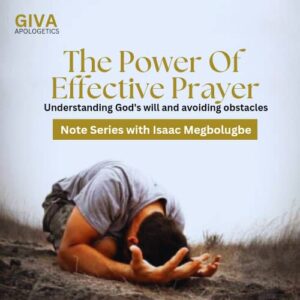The Power of Effective Prayer: Understanding God’s Will and Avoiding Obstacles
Isaac Megbolugbe
June 19, 2024

Introduction
Prayer is a fundamental aspect of the Christian life, and when done according to God’s will, can lead to tremendous blessings and answers. In 1 John 5:14-21, we are reminded of the confidence we have in approaching God and the importance of praying for others. However, sins and disobedience can block our prayers and disqualify us from receiving answers. In this article, we will explore the nature and characteristics of effective prayers, the sins that lead to death and those that do not, and how to pray for sins that do not lead to death.
Effective Prayers
Effective prayers are those that align with God’s will and are offered in faith. According to 1 John 5:14, “This is the confidence we have in approaching God: that if we ask anything according to his will, he hears us.” When we pray according to God’s will, we can be assured that He hears us and will grant our requests (1 John 5:15). Bold faith is essential in prayer, as it demonstrates our trust in God’s ability to answer us.
Sins That Lead to Death
In 1 John 5:16-17, we are warned about sins that lead to death, and are instructed not to pray for those who commit such sins. These sins are often referred to as “blasphemy against the Holy Spirit” (Matthew 12:31-32) and involve deliberate rejection of God’s grace and salvation. Praying for those who have committed such sins would be contrary to God’s will and would not be effective.
Sins That Do Not Lead to Death
On the other hand, there are sins that do not lead to death, and we are encouraged to pray for those who commit such sins. These sins are often referred to as “trespasses” (Matthew 6:14-15) and can be forgiven through repentance and prayer. When we pray for those who have committed such sins, we can ask God to give them life and restore them to a right relationship with Himself.
Obstacles to Effective Prayer
Several obstacles can block our prayers and disqualify us from receiving answers. These include:
– Unconfessed sin (Psalm 66:18)
– Disobedience (Proverbs 28:9)
– Lack of faith (James 1:6-8)
– Pride (Proverbs 16:5)
– Unforgiveness (Matthew 6:14-15)
Conclusion
Effective prayers are those that align with God’s will and are offered in faith. While sins and disobedience can block our prayers, we can have confidence that God hears us when we pray according to His will. By understanding the nature and characteristics of effective prayers, we can avoid obstacles and receive answers to our requests. Let us deepen our faith and approach God with boldness, knowing that He listens to us and desires to grant our requests.
References:
– 1 John 5:14-21
– Matthew 12:31-32
– Matthew 6:14-15
– Psalm 66:18
– Proverbs 28:9
– James 1:6-8
– Proverbs 17:17.